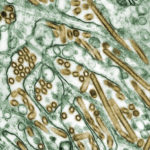Avian Flu Hits Taiwan
 The Chiayi County Department of Agriculture reported on February 13 that a poultry farm in Chiayi, Taiwan tested positive for the H5N6 avian influenza virus strain. The department added that the county inspectors discovered contaminated chickens at an unlicensed local butcher’s shop.
The Chiayi County Department of Agriculture reported on February 13 that a poultry farm in Chiayi, Taiwan tested positive for the H5N6 avian influenza virus strain. The department added that the county inspectors discovered contaminated chickens at an unlicensed local butcher’s shop.
This incident is the latest case of a poultry farm testing positive for the highly pathogenic virus. Taiwan’s health authorities reported the year’s first case of a human infected by avian influenza on February 4 and have been actively tracking the status of individuals who have had contact with the patient since then. The Centers for Disease Control (CDC) said on February 22 that the virus had developed various mutations allowing it to resist antiviral drugs, which is said to be more lethal to birds.
The first confirmed H5N6 infection in the country occurred the week after, at poultry farms in Hualien County and Yilan County. A turkey farm in Tainan was confirmed on February 12 to have infected birds, and, a day later, another poultry farm in Hualien was also declared H5N6-infected. With increasing confirmations of infections, about 4,000 chickens have been slaughtered, increasing the total number of birds slaughtered in the country this year to more than 130,000.
To address the crisis, the Taiwanese Cabinet established a Central Epidemic Response Center. During its first meeting, Premier Lin Chuan requested that municipalities cooperate with the central government to adopt different measures in containing the disease and disinfecting targeted areas. Some of these possible measures include imposing controls on movement.
State health departments have been monitoring all individuals connected with recent cases. These departments have also checked whether patients in local medical facilities with flu-like symptoms have been exposed to poultry carcasses.
CDC Deputy Director-General Chuang Jen-hsiang said that the CDC has prepared a variety of disease prevention equipment, including 1.97 million N95 surgical masks, 510,000 sets of protective clothing, and about 45 million other types of surgical masks.
The Taipei Department of Environmental Protection warned the public not to feed wild birds, imposing a maximum fine of feeding wilds birds of NT$6,000. As of February 27, a total of 53 poultry farms in eight Taiwanese counties have been confirmed to be infected with the avian flu virus.
